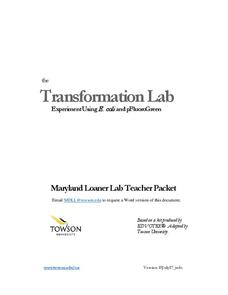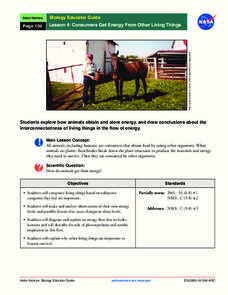Towson University
Transformation Lab
Transform your class' understanding of genes and antibiotic resistance with the Transformation Lab. Junior geneticists create and observe their own resistant strains of E. coli through research, discussion, and experimentation. The...
Curated OER
An Introduction to Microbes and Microbes Are Everywhere
Seventh graders define the term microbe. They identify the five main groups of microbes. Students give examples of ways in which microbes have impacted or currently impact human life. They create a hypotheses for where they expect to...
Curated OER
Teen Driving: Skills, Responsibilities and Reactions
As an introduction to the skills required for and responsibilities of driving, pre-teens and teens engage in a series of activities, chart their response times, and analyze how variables effect these reaction times. Class...
Curated OER
Antibodies and the Immune Response Lesson Plans - Biology Teaching Thesis
Students are introduced to bacteria and their role in biology and finishes with a lab experiment that focuses on antibiotics. They are given an overview of the important concepts involving bacteria and their potential resistance to...
NOAA
Watch the Screen!
Can a sponge cure cancer? Life science pupils visit the drugstore under the sea in the fifth lesson of six. Working groups research the topic then get hands-on experience by testing the inhibiting effects of several plant extracts...
Towson University
Mystery Disease
How did scientists determine the cause of illness before technology? Science scholars play the role of medical researcher in an engaging guided inquiry activity. Using observations, technical reading, and Punnett squares, learners...
Worchester Polytechnic Institute
Interactive Laboratory Activities for Secondary Education
Do you think the lab smells like rotten eggs? Sorry to hear about your sulfering. A set of five experiments covers many different topics including seasons, gravity, food, precipitation, and photosynthesis. Though not presented as a...
Curated OER
Honesty and Ethics in the Science Lab
Students complete a variety of lab and discussion activities as they are introduced to ethics and honest lab practices. They perform various biology, chemistry, or physics labs which test their ethical lab practices.
Serendip
Genetic Engineering Challenge – How Can Scientists Develop a Type of Rice That Could Prevent Vitamin A Deficiency?
Brown rice contains vitamins B and E, while white rice lasts longer in storage. The availability of rice around the world makes it a great candidate for genetic engineering. Scholars apply their knowledge of genetic engineering to solve...
Towson University
Case of the Crown Jewels
Can your biology class crack the Case of the Crown Jewels? Junior forensics experts try their hands at DNA restriction analysis in an exciting lab activity. The lesson introduces the concept of restriction analysis, teaches pipetting and...
Curated OER
Fishy Behavior
Here's a lab that may make you rethink that morning cup of coffee. Biology scholars test the effects of caffeine, alcohol, and nicotine on the behavior of zebrafish through an intriguing experiment. Learners observe fish...
NASA
Consumers Get Energy From Other Living Things
How do plants and animals get their food? Learn about where energy comes from, how animals store energy, and aerobic respiration, in a lesson that allows scholars to diagram energy flows.
Kenan Fellows
The Little Stuff Can Make a Big Difference
Great things come in small packages! What better way to illustrate this point than a week-long look at nanotechnology? Earth science scholars explore water quality issues through lab activities, then research new innovations in nanotech...
Curated OER
Biology: Howler Monkeys Tell All
Learners examine a PBS special about howler monkeys as an introduction to scientific forensic investigative methods. In groups, they conduct a host of experiments containing clues which point to discovery. By challenging assumptions,...
Kenan Fellows
Unit 3: Genetic Variation
What happens when genes change? Junior genetic investigators examine the effects of mutation in the third unit of a four-part Biotechnology series. Individuals discover the types of mutations through a series of PowerPoints, then partner...
Curated OER
Genetics and DNA
Students describe the structure of DNA and its components and can comprehend that real DNA and its cartoon representation are very different. They are able to link DNA to genetic make-up.
Curated OER
The Good and Bad Bacteria
Students are able to name one kind of harmful bacteria and why it hurts us and also name one kind of helpful bacteria and how we use it. They describe the process of growing bacterial cultures in a lab. Students create a reasonable...
Curated OER
DNA Fingerprinting: You Be the Judge!
Students use their knowledge of DNA fingerprinting to evaluate the use fingerprints in courts, and will address the ethics of establishing a national database of fingerprints.
Curated OER
DNA Detectives
In order to understand DNA fingerprinting, advanced biology aces divise a crime scenario and analyze three different samples of lambda DNA. This creative lesson plan provides practice with micropipettes, electrophoresis boxes, and other...
Curated OER
Jurassic Park: The Science and Ethics of Genetic Engineering
Explore genetic engineering through an engaging "Jurassic Park" unit, which is an extensive use of a cross-curricular teaching event. Planned for AP Biology, English, and Calculus young scholars, learners and teachers are involved for...
Curated OER
Light and Starch Production in Photosynthesis
Students are given the unique opportunity to see the contrast between parts of a leaf that have photosynthesized and parts of the leaf that have not. This visual image helps students see the results of this biological process. At the...
Curated OER
Consider the Issues
Students develop and express opinions on personal and societal issues in biology through journal entries (written and other forms), oral position statements and group discussions.
Curated OER
Bioethics: Tool for Portfolio and Performance Assessment
Students, in cooperative studying groups, assume the affirmative or negative position of a particular issue (premise). They research the issue and participate in a debate. In addition, they write essays to complete a portfolio entry.
Curated OER
Ecology of the Dump
High schoolers determine which types of garbage are biodegradable and which are nonbiodegradable. They practice measuring skills, hypothesizing, taking data, and writing a lab report. Students observe the relative biodegradability of...























